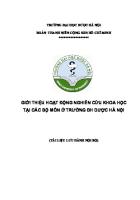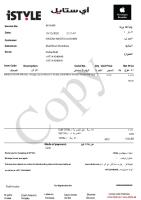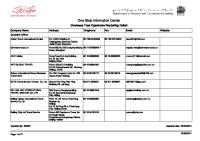MLQ New [PDF]
APPENDIX L: MULTIFACTOR LEADERSHIP QUESTIONNAIRE (RATER) RATER: -------------------- Multifactor Leadership Questionnai
39 0 36KB
Papiere empfehlen
![MLQ New [PDF]](https://vdoc.tips/img/200x200/mlq-new.jpg)
- Author / Uploaded
- mastermind_asia9389
Datei wird geladen, bitte warten...
Zitiervorschau
APPENDIX L: MULTIFACTOR LEADERSHIP QUESTIONNAIRE (RATER) RATER: --------------------
Multifactor Leadership Questionnaire
Rater Booklet (MLQM) by Bernard M. Bass and Bruce J. Avolio DIRECTIONS: This questionnaire is to describe the leadership style of your manager/supervisor. Describe the leadership style as you perceive it. Please answer all items below by entering in the block a number from the rating scale that best reflects your perception. If an item is irrelevant, or if you are unsure or do not know the answer, leave the answer blank. Please answer this questionnaire anonymously. Forty-five descriptive statements are listed on the following pages. Judge how frequently each statement fits the person you are describing. When you have completed all the questions, please SEND this questionnaire back to me via Groupwise. THANK YOU. Use the following rating scale: 0 Not at all
1 Once in a while
2 Sometimes
3 Fairly Often
4 Frequently if not always
THE PERSON I AM RATING...
1.
Provides me with assistance in exchange for my efforts
2.
Re-examines critical assumptions to question whether they are appropriate
3.
Fails to interfere until problems become serious
4.
Focuses attention on irregularities, mistakes, exceptions, and deviations from standards
5.
Avoids getting involved when important issues arise
6.
Talks about their most important values and beliefs
7.
Is absent when needed
8.
Seeks differing perspectives when solving problems
142
THE PERSON I AM RATING... 9.
Talks optimistically about the future
10. Instills pride in me for being associated with him/her 11. Discusses in specific terms who is responsible for achieving performance targets 12. Waits for things to go wrong before taking action 13. Talks enthusiastically about what needs to be accomplished 14. Specifies the importance of having a strong sense of purpose 15. Spends time teaching and coaching 16. Makes clear what one can expect to receive when performance goals are achieved 17. Shows that he/she is a firm believer in 'if it ain't broke, don't fix it:' 18. Goes beyond self-interest for the good of the group 19. Treats me as an individual rather than just as a member of a group 20. Demonstrates that problems must become chronic before taking action 21. Acts in ways that builds my respect 22. Concentrates his/her full attention on dealing with mistakes, complaints, and failures 23. Considers the moral and ethical consequences of decisions 24. Keeps track of all mistakes 25. Displays a sense of power and confidence 26. Articulates a compelling vision of the future 27. Directs my attention toward failures to meet standards 28. Avoids making decisions
143
THE PERSON I AM RATING... 29. Considers me as having different needs, abilities, and aspirations from others 30. Gets me to look at problems from many different angles 31. Helps me to develop my strengths 32. Suggests new ways of looking at how to complete assignments 33. Delays responding to urgent questions 34. Emphasizes the importance of having a collective sense of mission 35. Expresses satisfaction when I meet expectations 36. Expresses confidence that goals will be achieved 37. Is effective in meeting my job-related needs 38. Uses methods of leadership that are satisfying 39. Gets me to do more than I expected to do 40. Is effective in representing me to higher authority 41. Works with me in a satisfactory way 42. Heightens my desire to succeed 43. Is effective in meeting organizational requirements 44. Increases my willingness to try harder 45. Leads a group that is effective
144
Multifactor Leadership Questionnaire (MLQ) (Bass & Avolio) Ordering Information: http://www.mindgarden.com/products/mlq.htm Cost: When used for research purposes, must purchase or license reproduction of the forms. Mind Gardens also provides Web based collection of multi-rater data for researchers interested in using the Web. Brief Description: A 45 item questionnaire asking both the leader and selected staff members to rate the frequency of actions and behaviors of the leader, on a 5 point Likert scale, from 0 ( Not at all )-4 (Frequently, if not always). Can be administered in electronic or print form. Conceptual basis/how constructed: Transformational/transactional leadership framework. Measures key leadership and effectiveness behaviors shown in prior research to be linked with both individual and organizational success. Contains 9 leadership components and a full range of leadership styles. Population appropriate for: Leaders of any group and level (team leaders to executives). Appropriate for culturally diverse populations Setting: general Length of Administration: 15 minutes Instruction guide available: Yes Cost, if known: When used for research purposes, must purchase or license reproduction of the forms. Mind Gardens also provides Web based collection of multi-rater data for researchers interested in using the Web. Psychometric evaluation: Construct validation: 9 factor scores generated using factor analysis, items from recent literature on transformational leadership, and expert review of the items for adherence to conceptual model of the full range of leadership. Revised in 2004 from the original 6 factor model. • Contingent Reward • Intellectual Stimulation • Management-by-exception (passive) • Management-by-exception (active) • Laissez-faire leadership • Idealized Influence (behavior) • Idealized Influence (attributed) • Inspirational Motivation • Individual consideration
Reliability estimate: Reliabilities range from .74-.94 for each leadership factor scale. General Instructions: Participants first complete the MLQ-Leader form and then request 5 to 10 people familiar with their leadership behavior to complete the MLQ-rater form. The forms are then scored by a designated facilitator (or researcher) as follows: The MLQ scale scores are average scores for the items on the scale. The score can be derived by summing the items and dividing by the number of items that make up the scale. If an item is left blank, divide by the total number of items answered. 1. Contingent Reward- 4 Items #1,11,16 35 2. Intellectual Stimulation- 4 items #2,8,30,32 3. Management-by-exception (passive)- 4 items #3,12,17,20 4. Management-by-exception (active)- 4 items #4,22,24,27 5. Laissez-faire leadership- 4 items #5,7,28,33 6. Idealized Influence (behavior)- 4 items #6,14,23,34 7. Idealized Influence (attributed)- 4 items #10,18,21,25 8. Inspirational Motivation- 4 items #9,13,26,36 9. Individual consideration- 4 items #15,19,29,31 10. Extra Effort- 3 items #39,42,44 11. Effectiveness-4 items #37,40,43,45 12. Satisfaction- 2 items #38,41
Source: Mind Garden, Inc. References: Antonakis, J., Avolio, B. & Sivasubramaniam, N. (2003). Context and leadership: an examination of the nine-factor full-range leadership theory using the Multifactor Leadership Questionnaire. The Leadership Quarterly, 14, 261-295. Lowe, K., Kroeck, K., & Sivasubramaniam, N. (1996). Effectiveness correlates of transformational and transactional leadership: A meta-analytic review of the MLQ literature. Leadership Quarterly, 7(3), 385-425. Stordeur, S., Vandenberghe, C., & D’hoore, W. (2000 January/February). Leadership styles across hierarchical levels in nursing departments. Nursing Research, 49(1), 37-43.









